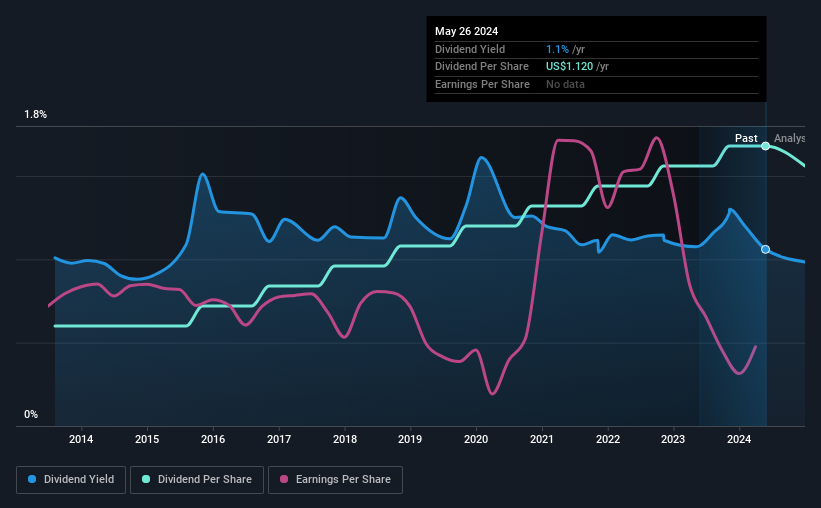Only Four Days Left To Cash In On Nelnet's (NYSE:NNI) Dividend
Nelnet, Inc. (NYSE:NNI) stock is about to trade ex-dividend in four days. Typically, the ex-dividend date is one business day before the record date which is the date on which a company determines the shareholders eligible to receive a dividend. The ex-dividend date is an important date to be aware of as any purchase of the stock made on or after this date might mean a late settlement that doesn't show on the record date. Meaning, you will need to purchase Nelnet's shares before the 31st of May to receive the dividend, which will be paid on the 14th of June.
The company's next dividend payment will be US$0.28 per share. Last year, in total, the company distributed US$1.12 to shareholders. Looking at the last 12 months of distributions, Nelnet has a trailing yield of approximately 1.1% on its current stock price of US$105.68. Dividends are a major contributor to investment returns for long term holders, but only if the dividend continues to be paid. We need to see whether the dividend is covered by earnings and if it's growing.
Check out our latest analysis for Nelnet
Dividends are typically paid from company earnings. If a company pays more in dividends than it earned in profit, then the dividend could be unsustainable. That's why it's good to see Nelnet paying out a modest 29% of its earnings.
When a company paid out less in dividends than it earned in profit, this generally suggests its dividend is affordable. The lower the % of its profit that it pays out, the greater the margin of safety for the dividend if the business enters a downturn.
Click here to see how much of its profit Nelnet paid out over the last 12 months.
Have Earnings And Dividends Been Growing?
Companies with falling earnings are riskier for dividend shareholders. If business enters a downturn and the dividend is cut, the company could see its value fall precipitously. With that in mind, we're discomforted by Nelnet's 7.4% per annum decline in earnings in the past five years. When earnings per share fall, the maximum amount of dividends that can be paid also falls.
Another key way to measure a company's dividend prospects is by measuring its historical rate of dividend growth. Nelnet has delivered 11% dividend growth per year on average over the past 10 years.
To Sum It Up
Is Nelnet an attractive dividend stock, or better left on the shelf? Nelnet's earnings per share are down over the past five years, although it has the cushion of a low payout ratio, which would suggest a cut to the dividend is relatively unlikely. It doesn't appear an outstanding opportunity, but could be worth a closer look.
So if you want to do more digging on Nelnet, you'll find it worthwhile knowing the risks that this stock faces. To help with this, we've discovered 2 warning signs for Nelnet (1 makes us a bit uncomfortable!) that you ought to be aware of before buying the shares.
If you're in the market for strong dividend payers, we recommend checking our selection of top dividend stocks.
Have feedback on this article? Concerned about the content? Get in touch with us directly. Alternatively, email editorial-team (at) simplywallst.com.
This article by Simply Wall St is general in nature. We provide commentary based on historical data and analyst forecasts only using an unbiased methodology and our articles are not intended to be financial advice. It does not constitute a recommendation to buy or sell any stock, and does not take account of your objectives, or your financial situation. We aim to bring you long-term focused analysis driven by fundamental data. Note that our analysis may not factor in the latest price-sensitive company announcements or qualitative material. Simply Wall St has no position in any stocks mentioned.

 Yahoo Finance
Yahoo Finance 
